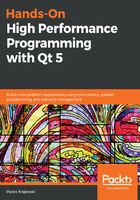
Avoiding repeated computation
The techniques falling under the first point are concerned with unneeded repetition of work. The basic counter measure here is caching, that is, saving the results of computation for later use. A more extreme example of avoiding repletion of work is to precompute results even before their first usage. This is normally achieved by hand-coded (or generated by a script) precomputed tables or, if your programming language allows that, with compile-time computation. In the latter case, we sacrifice compilation times for better run-time performance. We'll have a look at C++ compile time techniques in Chapter 3, Deep Dive into C++ and Performance.
Choosing the optimal algorithm and data structure also falls into that realm, as different algorithms and data structures are optimized for different use cases, and you have to make your choice wisely. We'll have a look at some gotchas pertaining Qt's own data structures in Chapter 4, Using Data Structures and Algorithms Efficiently.
The very basic techniques such as pulling code out of a loop, such as the repeated computations or initializations of local variables, fall into that class as well, but I'm convinced you knew about this already.